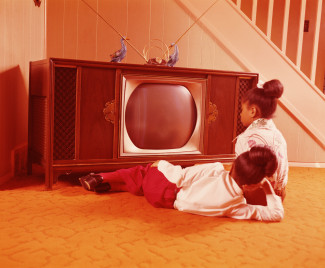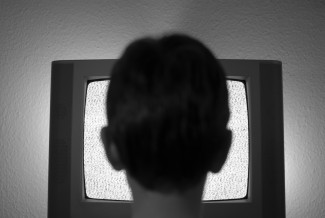
Johns Hopkins UniversityEst. 1876
America’s First Research University
Managing Screen Time

The relationship between American children and television had has many twists and turns. The Spring issue of the Journal of the History of Childhood and Youth features an essay by Colin Ackerman, a Research Associate for the Collaborative for Academic, Social, and Emotional Learning (CASEL), on the regulatory efforts of the federal government over children's television programming over the past 75 years.
Ackerman joined us for a Q&A about "Public or Private Interest?: The History and Impacts of Children’s Television Public Policy in the United States, 1934 to Present."
How did you develop this essay for the journal?
This essay developed out of a general curiosity about the FCC. As I began my graduate studies, I had a broad curiosity relating to the intersection of mass media and children. This curiosity quickly brought me to children's television and the FCC was a consistent presence in the literature I was reading. I observed the FCC was frequently maligned as ineffectual; however, there was little discussion on what factors led to it being viewed as ineffective. There were various discourses relating to the failure of the FCC when it comes to children's television. With this essay, I sought to bring those discourses into conversation with one another into a cohesive claim.

How much has the reactionary nature of the FCC and its lack of significant authority impacted developments in children's television?
The United States was founded on the ideal of economic liberty (among other liberties); therefore, capitalism is tightly woven into the DNA of American society. Due to this, private interests had a seat at the table into developing children's television from the start. Since the FCC had inadequate mechanisms to balance the private interests of industry and the public interest of educating youth, children's television is largely driven by an economic motor. This has created an environment where all children's entertainment must be approached with a critical lens as it has the potential to prime youth to rationalize values of consumerism without a democratic counterweight.
How has the growth of programming options in recent years changed things for children's television programming?
The massive shift in children's television has less to do with the number of options and more to do with the medium through which that programming is consumed. As media ecologist Marshall McLuhan famously said, "The medium is the message." Watching children's television through a tablet while your parents eat dinner at a restaurant is a starkly different experience than viewing it through a television in your home. Now that children's television is more portable, I think it makes it more personal to youth. This is not necessarily a bad thing, but if left unchecked I worry about children's television having an increasing impact on the formation of a youth's self-image and identity.

What other areas of inquiry do you hope your essay inspires?
I hope this essay prompts inquiry into the role of federal policy and non-television digital content aimed at children (such as websites like clubpenguin.com or interactive apps). Digital media and technology have transformed and will continue to transform how we as human's act and interact in the social world. There needs to be work done examining and appraising the actions of the federal government, because just as the FCC presented a specter of regulation over television in the 20th century I fear similar actions or agencies will be seen as substantive, only to be realized as hollow.
What made JHCY the best outlet for your essay?
The JCHY was an excellent outlet because I was looking to frame the FCC ineffectiveness through a historical lens. My background is in the Media Studies field, which unfortunately can sometimes make statements from an ahistorical perspective (particularly when discussing popular culture). My aim was to historicize the FCC in two ways: through the experience of youth and through the policy actions behind the scenes. Due to this, I ventured outside the journals familiar to my discipline to put my thoughts in a new intellectual space—the mission of the JHCY aligned with my values and has turned out to be an excellent home for this work.


